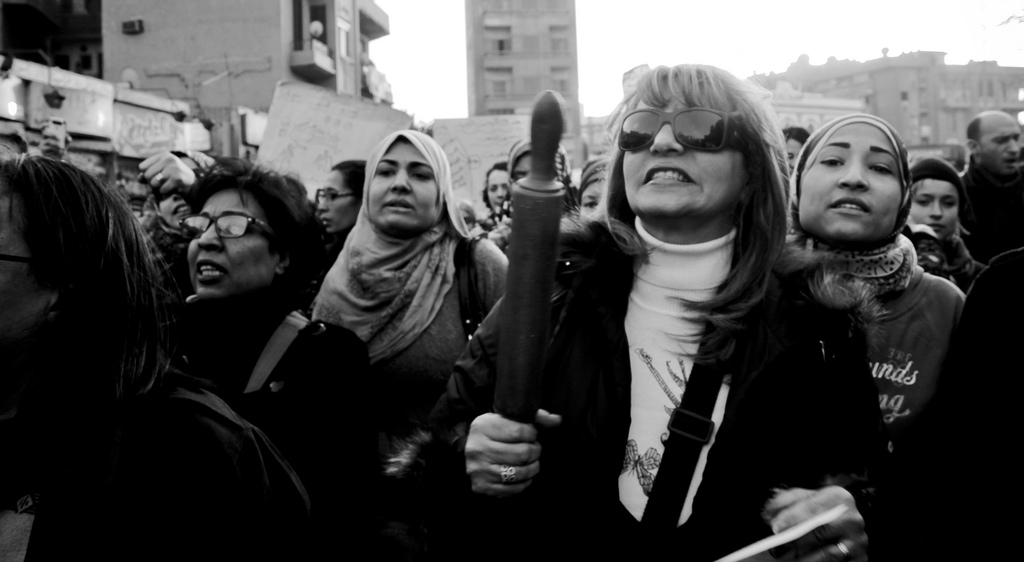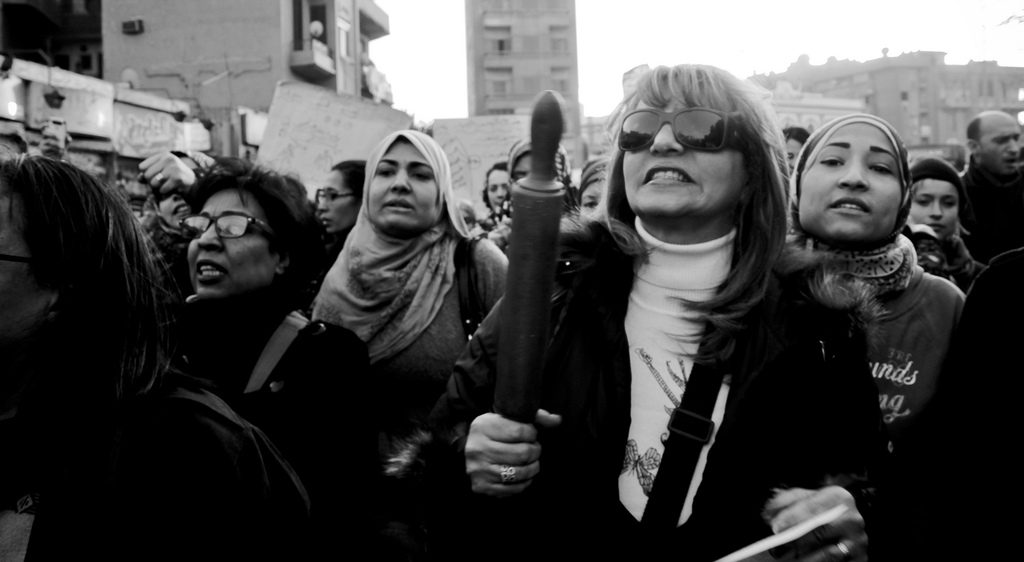 Domestic violence is a widespread phenomenon in Egypt which, despite its prevalence, is largely misconstrued. 60 percent of Egyptian women conceded to being victims of domestic violence according to a 2012 Egyptian Centre for Women’s Rights (ECWR) report, and a lack of women’s rights was arguably one of the driving factors behind high female participation in the 25th January 2011 and 30th June 2013 revolutions. The payoff has, however, been markedly low. Hopes for legislative change in favor of Egypt’s women have been tempered by modest gains. While a women’s quota of 56 seats is included in an otherwise controversial parliamentary law, only four women were appointed to the first cabinet under newly elected President Abdel Fattah al-Sisi.
Domestic violence is a widespread phenomenon in Egypt which, despite its prevalence, is largely misconstrued. 60 percent of Egyptian women conceded to being victims of domestic violence according to a 2012 Egyptian Centre for Women’s Rights (ECWR) report, and a lack of women’s rights was arguably one of the driving factors behind high female participation in the 25th January 2011 and 30th June 2013 revolutions. The payoff has, however, been markedly low. Hopes for legislative change in favor of Egypt’s women have been tempered by modest gains. While a women’s quota of 56 seats is included in an otherwise controversial parliamentary law, only four women were appointed to the first cabinet under newly elected President Abdel Fattah al-Sisi.
A recent spate of mass attacks on women in Cairo’s public spaces also prompted Sisi to visit a victim of sexual assault in hospital—a first for an Egyptian president. Meanwhile, Interior Minister Mohamed Ibrahim announced this week the establishment of a new department in his ministry focused on violence, including sexual assault and harassment, against women.
The implicit need for additional security measures is further illustrated in ECWR’s report which outlines that whilst, more than half of Egyptian women are abused in the home, 88 percent of them have been subjected to Female Genital Mutilation (FGM), and 38 percent were forced into early marriages. The study also sheds light on the rate of violence against women outside the home. Whether the new security unit will deal with such issues and its effectiveness remains unclear.
Key obstacles in confronting this practice include underreporting, cultural norms, and legislation. Underreporting is linked to cultural taboos since, in most cases, the perpetrator is recognized as an intimate partner. According to the semi-governmental National Council for Women’s (NCW) 2009 report on combatting violence against women and children, a woman is more likely to be assaulted or killed by a current or former partner than by any other person. Legislation may also be a barrier given the laborious legal prerequisites to report domestic abuse.
“Although many women want to report abuse, the penal code dictates the need for a witness which, compounded by cultural attitudes, makes it an extremely arduous process,” explains Dr Fatima Khafagy, a parliamentary candidate, co-founder of women’s rights initiative, Women for Women, and former head of the Office of Ombudsperson for Gender Equality at the NCW. The interior ministry’s new department faces the same obstacle, which, admittedly may not seem as challenging where public sexual harassment is concerned, but the very same cultural attitudes could be an impediment. According to Assistant Interior Minister for Human Rights Abu Bakr Abdel-Karim, police will attempt to arrest culprits red-handed, otherwise they will have to depend on eye witnesses.
Cultural misconceptions surrounding the idea of abuse have led to society’s acceptance of it as an element of marital relationships. Rabaa Mohamed, a secretary at Psychological Health and Awareness Society Egypt (PHASE), NGO that supports victims like herself, explains that many women absurdly associate violence with manhood. “It is socially acceptable for a husband to hit or betray his wife. Many women expect to be beaten,” she says.
Experts refer to the need re-define domestic violence and provide a more holistic classification. Psychiatrist Dr. Heba Habib, a board member at PHASE, defined the practice as physical, sexual, verbal, emotional, psychological and financial abuse.
Psychological abuse or emotional abuse is one of the most pervasive and unreported forms of domestic violence in Egypt, according to experts, given its intangibility. It constitutes subjecting an individual to behavior that may prompt psychological trauma, anxiety, depression, or post-traumatic stress disorder. Degradation of the other is typical of this type of abuse.
One female, who like many victims requested, her anonymity given social stigmas, recounts her story.
“He was the love of my life, but once we married the abuse began, he bullied and insulted me on a daily basis and even forced me to abort my baby,” she explains. Her family was unsympathetic, given the cultural taboos. Prenatal mortality caused by domestic abuse is commonplace in Egypt, according to Khafagy.
For some victims, emotional and physical abuse is interlinked. “It took me four years to get my family’s approval to divorce my ex-husband who used to be beat me so badly that following one incident I was bedridden for a week,” says Basmaa, a 29-year-old victim.
Although Basmaa had requested a divorce after only eight days of marriage to her cousin, (a cultural norm to marry blood relatives in Egypt) like many victims she was forced to endure prolonged violence due to narrow cultural beliefs. Social constraints also prevent victims from seeking refuge in women’s shelters, since it is not culturally permissible for women to leave the family home. Such brutality and emotional neglect can often lead many victims to contemplate suicide.
Cultural attitudes have had a distinct impact on domestic violence trends. Habib draws on FGM, a brutal practice which, according to UNICEF, over 27 million Egyptian women have undergone, as an example of cultural and domestic violence. Interfering relationships with in-laws, particularly the mother-in-law, was also highlighted as major form of cultural abuse and cause for divorce.
Though protective articles exist in the 2014 Egyptian constitution, the law fails to safeguard women against abuse, as culture remains the key legislator.
“Underreporting due to social taboos has, in effect, eliminated the role of the authorities as law enforcers,” explains Migad al-Boraey, an attorney in the court of cassation and a human rights advocate.
Women’s rights experts also draw attention to frailties in the constitution and laws, which remain vague and fail to distinguish between the various forms of violence. Article 11, the central article tackling domestic violence, states:
Article 60 also broaches the matter but is even more ambiguous:
Khafagy is critical of the law’s ambiguity clearly displayed in Article 11, and the absence of specific penalties in the penal code, leaving the final verdict entirely up to the judiciary’s discretion. Further criticism is directed towards the challenging legal preconditions to report domestic crimes; namely the female victim must find a witness who is willing to testify that they saw the entire assault. Experts highlight that amending one article is not sufficient without taking further steps in tandem to guarantee overall progress. Accordingly, Khafagy favors the notion of one comprehensive law that covers violence in its various forms and assigns justifiable penalties, as well as prevention and protection measures for victims and witnesses.
In an attempt to address this lack of explicit legal accountability a protective law was drafted in collaboration with multiple stakeholders in 2012. The draft law was recently shared with the Prime Minister, Ibrahim Mahlab and is waiting to be ratified by the president, Khafagy revealed. Submitted to outgoing president Adly Mansour, who ratified a slew of laws before his final day in office, it now awaits Sisi’s attention.
Ultimately a genuine paradigm shift within the Egyptian culture is imperative in order to confront this deep-rooted social ailment. Many victims task Sisi and his government in facilitating this critical cultural shift. Increased awareness, community collaboration and legislative enactment are paramount experts say. Khafagy emphasizes the need for a more holistic collective approach combined with political will.
“Women should have used the 2014 presidential elections as a bargaining chip to ensure the new domestic violence law is passed and other key demands are met,” the female activist outlined. Women’s rights need to be at the forefront of the new government’s agenda stresses Khafagy; the four new female ministers evidently have a colossal undertaking ahead.
Sarah El-Rashidi graduated from Cambridge University with a Masters in International Relations, which encompassed a thesis focused on the Muslim Brotherhood’s pursuit of legitimacy under Mubarak.
Image: Women%20Egypt%20Gigi%20Ibrahim.jpg
